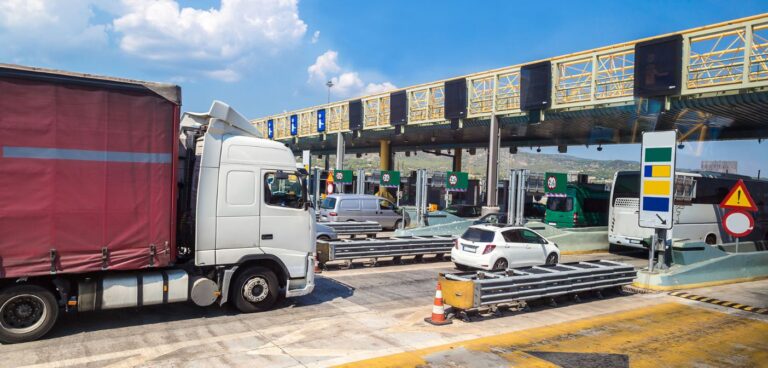Road charges for trucks in EU member states will move from time-based to distance-based charging, under new rules adopted by the European Parliament today.
MEPs approved an agreement with EU governments on the update of the rules defining the charges member states can impose on trucks, lorries, buses, vans and passenger cars using trans-European transport (TEN-T) network roads.
According to the European Parliament, the reform will not force EU member states to charge vehicles using their roads. However, should they choose to do so, they will need to follow EU rules.
The aim of the new legislation is to move road charging from a time-based model to distance-based or an actual kilometres-driven system, to better reflect polluter-pays and user-pays principles.
Following today’s ruling, EU members states will phase out vignettes – time-based road charging – for heavy-duty vehicles across the core TEN-T network within eight years of the new rules entering into force, and start applying tolls, or distance-based charges.
However, member states will still be able to retain vignettes for specific parts of this network, if they can prove that a new mode of charging would be disproportionate to expected revenue.
To encourage the wider use of more environmentally-friendly vehicles, by May 2023, hauliers operating zero-emissions trucks – battery-electric or hydrogen – must be given discounts of at least 50% on distance-based road tolls.
According to Transport & Environment (T&E), Member states could opt to levy extra CO2-based charges on fossil-fuel lorries instead, or implement both measures. With road tolls reportedly costing hauliers up to €25,000 a year per truck annually, switching to zero-emissions vehicles will cut their overheads considerably.
“This is a watershed for green trucking. Fossil-fuel trucks will finally have to pay more if they emit more, and hauliers who switch to emissions-free vehicles will slash their costs,” said James Nix, freight policy manager at T&E. “But the clock is ticking on national governments to have the cleaner, fairer system in place on time. Europe cannot wait any longer to tackle this major source of emissions.”
What’s more, from 2026, EU countries will have to set different road charging rates based on CO2 emissions for trucks and buses, and on environmental performance for vans and minibuses. They will also have to reduce the charges for zero- or low-emission vehicles. Currently, only four EU member states charge trucks for their air pollutants.
According to T&E, trucks are responsible for 23% of the EU’s climate emissions from road transport and, according to data from Copenhagen, Paris and London, account for more than 20% of road vehicles’ emissions of NOx.
Under the new rules, vignettes will be valid for shorter periods – one day, one week or 10 days – and have price caps that can be imposed on passenger cars, to ensure occasional drivers from other EU countries are treated fairly. EU countries willing to charge lighter vehicles, such as vans, minibuses and passenger cars, will still be able to choose between toll or vignettes systems.
Three years after the entry into force of the rules, member states will report publicly on tolls and user charges levied on their territory, including information on how they are using these revenues. MEPs said they want the revenues generated from these charges to contribute to sustainable transport, infrastructure and mobility.
European Parliament rapporteur Giuseppe Ferrandino said: “The elimination of the vignette for heavy vehicles will standardise a system that is currently excessively fragmented. We will encourage the world of transport to use cleaner vehicles.
“I am very pleased to have obtained the introduction of the one-day vignette for all vehicles in circulation, which will allow travellers in transit to pay a fair price for their journey. This is also a positive development for tourism: it ensures that travellers will not be penalised.”
The rules will enter into force 20 days after they are published in the Official Journal of the EU. Member states will have two years to prepare for the application of new rules.
You can learn more about the key trends and challenges affecting senior decision-makers who have responsibility for tolling, intelligent transportation systems and road pricing at the 19th annual Road User Charging Conference in Brussels, Belgium on 04-05 May 2022. Visit www.roaduserchargingconference.co.uk for more information.





